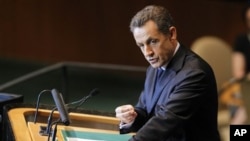As diplomats scramble to avert a Palestinian request for full United Nations recognition this week, the European Union remains deeply divided on the issue. Analysts say the differences may undermine Europe's efforts to play a meaningful role in the Middle East peace process.
Related video report by Henry Ridgwell
|
Palestinian Statehood Bid Breakdown
|
As a member of the so-called Quartet of Middle East peace mediators, the European Union is a key player in current efforts to head off a statehood bid by Palestinian leader Mahmoud Abbas. Two EU members, France and Britain, sit on the United Nations Security Council - the body that might vote on such an application.
The United States and Israel are strongly opposed to such a bid. The U.S. Congress has threatened to cut assistance to the Palestinians. But as the deadline looms ahead of Mr. Abbas' address before the U.N. on Friday, the EU has yet to clarify its position.
Addressing the U.N. General Assembly Wednesday, French President Nicolas Sarkozy said the Palestinian claim for a state is legitimate - but he cautioned against the push for recognition now as a full U.N. member. He also said that a veto in the Security Council could spark a cycle of violence in the Middle East. He instead proposed an interim stage of offering the Palestinians a U.N. status of observer state.
Vivien Pertusot, head of the Brussels office for the French Institute of International Relations, is not surprised at the divisions among EU members. "At this stage - and I don't think that it's going to happen - there is no EU common position. There are some strong divisions among the member states," Pertusot said.
Pertusot divides the EU's 27 members into four camps. Those favoring a Palestinian statehood bid include Spain, Sweden and Luxembourg. Germany, Italy and Czech Republic count among those against. There is also the "wait-and-see" camp. And the "uncertain camp" - which includes Britain and France.
In an interview on France 24 news channel, the Palestinian representative to the EU, Leila Shahid, said the EU divisions are reflected in other aspects of its foreign policy.
Shahid noted Europe also failed to adopt a common position on recognizing Kosovo and on the NATO air campaign in Libya. Still, she urged the EU to speak with a common voice at the U.N.
Those pushing for a European "yes" to Palestinian recognition at the U.N. offer a number of arguments, including that it would keep alive a two-state solution for Israel and the Palestinians. By voting against, they argue, the Europeans may be accused of hypocrisy - for supporting popular Arab Spring uprisings but not Palestinian aspirations. But others reject a unilateral declaration without a negotiated settlement first between the Israelis and Palestinians.
Rene Prange, a member of the nongovernmental group France Palestine Solidarite, believes France and other EU members are also concerned about damaging their relationship with Washington.
"I think they would like to have [a] Palestinian [state]…recognized but on the other hand, they don't want to have a struggle with the United States and on top of that the European Union doesn't speak as a single body," Prange said.
Still, if it comes to a vote, the French Institute's Pertusot believes France and Britain may well back a Palestinian statehood bid at the Security Council - with an important caveat.
"They're not going to support any kind of resolution. So it all depends on the wording of the resolution," Pertusot said.
Pertusot believes the EU's problem is partly a public relations one. "What the EU hasn't been doing enough is to explain that the resolution is just one step and the peace process is going to continue after the resolution and that's where the EU can play a significant role," Pertusot said.
The European public appears more united. Two recent polls show the majority of Europeans favoring Palestinian statehood. One of the polls, by the BBC, also finds 45 percent of Americans favoring a statehood bid at the United Nations, compared to 36 percent against.




